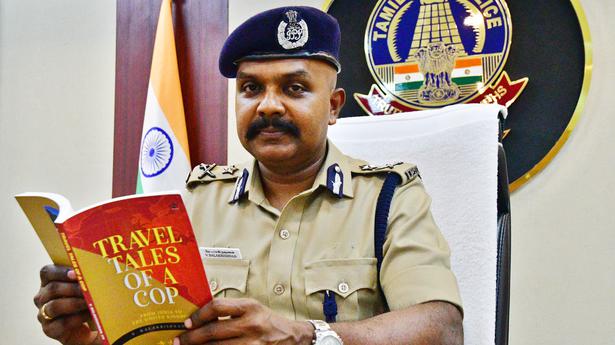
Commissioner of Police V Balakrishnan’s first book ‘Travel Tales of a Cop’ launched at the Coimbatore Book Festival
The Hindu
Commissioner of Police V Balakrishnan’s first book Travel Tales of a Cop launched at the Coimbatore Book Festival is a comparison of policing systems in the UK and India
“Policing by consent in the UK, policing by enforcement in India are two different aspects,” says city’s Commissioner of Police V Balakrishnan IPS. His first book Travel Tales of a Cop (Zero Degree Publishing) draws a comparison between the policing systems of the UK and India starting from the historic background (modern policing in India was introduced by the British) to the current scenario.
The book took shape while he was in the UK as a Chevening Scholar to complete his Post Graduation in Human Rights. “I took notes on policing and cultural aspects that are common to India as well as those that are starkingly different. I found it fascinating. I started writing this book in September 2018 and took two years to finish it.”
Talking about the chapter that highlights the rights of victims and offenders, he says the system in India is often victim-oriented and gives an example of an incident of burglary at a senior citizen’s house. “In an act of self defence, the offender was stabbed to death. He was a habitual offender, and had amassed wealth through his criminal activities. But when he died, the family erected a shrine in front of the senior citizen’s house and the older couple vacated their house out of fear. This exposes the deficiency in the enforcement system.”
The author also touches upon general administration and economic models that can be replicated here. To drive home the point on the need of strong watchdog for public services, he quotes the example of how an independent watchdog agency penalised Thames Water that supplies water to London households in 2019 for its failure to keep leakage under a specific percentage. “The supplier was asked to pay huge compensation to customers in the form of monthly cuts in water charges for the next six years. I have mentioned this in the context of road accidents in India. In one of the rarest cases, the Madurai High Court fixed the responsibility on the highway authorities for failure in maintaining the road as the reason for an accident. A fine was slapped and the NHAI was directed to pay a compensation. Accidents happen because of poor road conditions, but there is no accountability on the contractor, etc.”
While the book is broadly a comparison of administration and cultural traits of both the countries, he also talks of invisible policing, a concept adopted in the UK. “You cannot see the police on the road unless it is an accident or a crime scene. That’s not the case in India.”
One of the chapters highlight ‘right to protest’ with a mention of the famous episode on the eve of Donald Trump’s visit as State guest to the UK in 2018. Protestors flew a giant balloon with a blimp of ‘baby Trump’ over Parliament Square, London. “The level of tolerance and the right to protest is respected. Political leaders take holidays and respect their family time. In India, it often draws flak. When Theresa May, who was the Prime Minister of UK, was holidaying in Europe, a major incident hit the headlines. A drunken driver rammed his vehicle against the Parliament Wall. Initially, it was thought as a terrorist act. Theresa May issued statements while still on holiday. In India, it is unthinkable. I have emphasised the importance of having strong systems and institutions in place. Once the strength of the system is in place, it is immaterial who is running it.”
After writing short stories and career-related articles in magazines, Shweta Subbiah Balakrishnan turns author with her first book Promises Kept (Estilo Books) that was launched at the Coimbatore Book Festival.

Prodancy Pvt Ltd, a medtech startup specialising in surgical consumables for joint replacement surgeries, has successfully raised ₹2.14 crore in a funding round co-led by Campus Angels Network and Keiretsu Forum Chennai, which also saw participation from existing investors Center for Cellular & Molecular Platforms (C-CAMP) and other angel investors.

“Writing, in general, is a very solitary process,” says Yauvanika Chopra, Associate Director at The New India Foundation (NIF), which, earlier this year, announced the 12th edition of its NIF Book Fellowships for research and scholarship about Indian history after Independence. While authors, in general, are built for it, it can still get very lonely, says Chopra, pointing out that the fellowship’s community support is as valuable as the monetary benefits it offers. “There is a solid community of NIF fellows, trustees, language experts, jury members, all of whom are incredibly competent,” she says. “They really help make authors feel supported from manuscript to publication, so you never feel like you’re struggling through isolation.”









